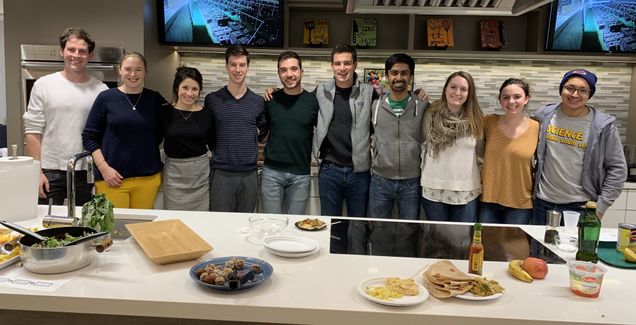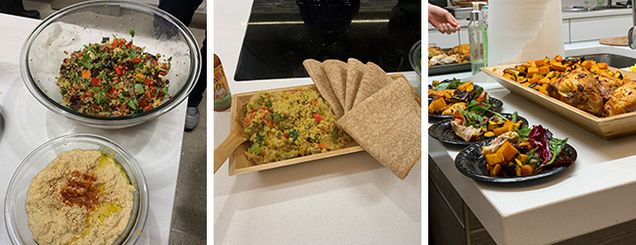Cooking for a Cause: Understanding How Nutrition Impacts Patients

This fall, nine first-year medical students participated in Eat to Treat, a seminar aimed at increasing knowledge about nutrition and how it relates to overall health.
The seminar, held in the BMC Teaching Kitchen, focuses on integrating nutrition and diet education through cooking and counseling techniques. “It provides future physicians with a deeper understanding of how nutrition and diet impact chronic conditions and the challenges many patients face in attempting to maintain a healthy lifestyle,” said Boston Medical Center (BMC) dietitian and one of the lead instructors of the course Olivia Weinstein, RD, LDN, MS.
Now in its third run, Eat to Treat is a voluntary six-week seminar for students held on Monday nights, led by volunteer instructors who provide hands-on sessions covering nutrition education, meal preparation and practice counseling. The seminar culminates with a cook-off competition between students based on the skills and knowledge they acquired throughout the semester.
Students paired off and were given realistic scenarios with fictional patients who had different dietary restrictions and cooking equipment limitations. They were given 10 minutes in the BMC Preventive Food Pantry to select product and grocery items, and 40 minutes to prepare and cook. This years’ creations include:

- Hummus and a Mediterranean quinoa salad for Claude, a 46-year-old with diabetes who works four 12-hour shifts a week. He is open to cooking but only has a microwave while his kitchen is being remodeled. His husband has been interested in more vegetarian meals.
- A veggie egg wrap with greens in a whole-wheat tortilla and fruit on the side for Cindy, a 16-year-old cheerleader who is concerned with her weight, despite her high level of activity. She skips breakfast most days and often reheats frozen food when she gets home late from school and cheer practice.
- Roasted chicken and veggies, greens and a fruit salad for dessert for Frostina, a 72-year-old grandmother with somewhat of a limited budget and hypertension. She believes in cooking fresh daily for her children and grandchildren in their triple decker.
“There is a stigma with healthy food, that it’s expensive to prepare, but we learned there are cost-effective ways of making quick and nutritious food and it was really useful to learn those tips,” said Mohsin Dahodwala.
Suveer Desai said the most important thing he learned was “talking to patients about nutrition and being sensitive to their background and situations.”
The course was created by: Kate Donovan, RD, LDN, MS, BU Sargent College Adjunct Clinical Instructor of Nutrition, Clinical Coordinator of BMC’s Pediatric Nutrition and Fitness for Life (NFL) program; Katie Epstein, RD/MS candidate at Sargent College; Ty Sweeney, third-year BUSM MD student; and Ms. Weinstein.
Tracey Burg, RD, LDN, head chef and dietitian, BMC’s Teaching Kitchen, secured the facility and taught several of the sessions. Resources were supplied by the BMC’s Nutrition Resource Center which includes the Preventive Food Pantry, Teaching Kitchen and Rooftop Farm.